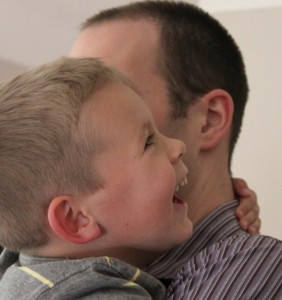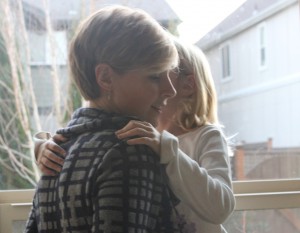Parenting is the most rewarding yet most challenging job there is. Children change so quickly. What worked yesterday may not work today, and what works today may not work tomorrow. Being creative in our parenting is practically a must.
Each child is different and needs to have her needs met in a way that works for her. Honesty and communication can ease anxiety and help a child to understand the world around him. Finding ways to explain certain concepts, ideas or situations to young children may take some creative thinking but is far better than dismissing a concept as being too mature for a child to comprehend.
My husband has a wonderful job that he excels at. His career and hard work allow me the privilege to be home to raise our daughter. My daughter and I have endless amounts of fun together every day, and we are certainly just about as close as mother and daughter can be. While our little girl definitely enjoys her mommy time, she is undoubtedly Daddy’s little girl. She stands watch at the door when she knows he is on his way home, loves to play with him every evening, and looks forward to family time on weekends.
My husband’s job does require a certain amount of travel. Since becoming parents, we have been rather fortunate that there has been minimal travel, usually not amounting to more than a few days at a time. The last time my husband had to go out of town, our daughter was a little over a year old and didn’t entirely understand the concept of him leaving. She was happy when he was returned home but didn’t seem to be too affected by his absence.
This past business trip, however, required my husband to be out of town for two weeks. Two weeks is a long time for us to be apart from our favorite person.
While technology has made it much easier to keep in touch during the absence of a loved one (Face Time has been our family favorite), time can still be a difficult concept for toddlers to fully comprehend. Our daughter is two and understands pretty well the meaning of yesterday and tomorrow. Explaining to her the concept of Daddy being gone for two weeks, however, was not an easy task. I decided to make a tangible representation of two weeks for our daughter in the form of a countdown chain.
At the end of each day, after a Face Time session with Daddy, I had our daughter tear off a link in the chain. Each link represented a day that Daddy was gone. At the end of the chain was a circle with the words “Daddy is Home!”
This method worked brilliantly. With each paper link she tore off, our daughter would happily say, “We are one day closer to Daddy!” While our little girl certainly missed her daddy, she found it much easier to understand when he was coming home with the help of her countdown chain.
Children are far brighter than we sometimes give them credit for. Just because they are not able to fully understand a concept in the way that an adult might, it doesn’t mean that they are unable to understand that very same concept when put in terms that they can relate to.
All it takes is a little creativity and a whole lot of love.

.jpg)








 Remember that by opting for encouragement over praise, you’re not ignoring your kids’ accomplishments or successes. Encouragement is simply about keeping your response focused on their efforts and feelings as opposed to only the outcomes. Encouraging words not only reassure kids during times of success (“Wow, that took a lot of concentration!”), but also in times of disappointment (“I have faith in you to fix this mistake.”). Instead of looking to a parent for affirmation, kids are able to decide how they feel about themselves. Their failures and successes, as they should be, are about them, not anyone else.
Remember that by opting for encouragement over praise, you’re not ignoring your kids’ accomplishments or successes. Encouragement is simply about keeping your response focused on their efforts and feelings as opposed to only the outcomes. Encouraging words not only reassure kids during times of success (“Wow, that took a lot of concentration!”), but also in times of disappointment (“I have faith in you to fix this mistake.”). Instead of looking to a parent for affirmation, kids are able to decide how they feel about themselves. Their failures and successes, as they should be, are about them, not anyone else.